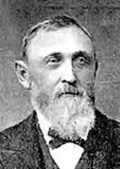the Fourth Week of Advent
Click here to join the effort!
Bible Commentaries
The Fourfold Gospel Fourfold Gospel
Old Testament
Jesus' life, teachings, and fulfillment of Old Testament prophecies as the Messiah. Mark
A fast-paced account of Jesus' ministry, focusing on his actions and sacrificial death. Luke
Jesus' life, emphasizing compassion for the marginalized and the universal scope of salvation. John
Theological reflections on Jesus as the Word of God, focusing on his divine nature and mission.
Author's Biography
John William McGarvey (1829-1911) was a distinguished biblical scholar, educator, and a pivotal figure in the American Restoration Movement, which sought to restore the practices of the early Christian church. Born in Hopkinsville, Kentucky, McGarvey's intellectual and spiritual journey led him to become one of the most respected religious thinkers of his time, particularly within the Churches of Christ and the Disciples of Christ.
McGarvey's education at Bethany College, where he was deeply influenced by Alexander Campbell, one of the movement's founders, set the foundation for his lifelong commitment to Christian unity and the authority of the Scriptures. After his graduation, McGarvey dedicated himself to the ministry and higher education, eventually serving as a professor and then president of the College of the Bible in Lexington, Kentucky, which is now part of Lexington Theological Seminary.
Throughout his career, McGarvey was prolific in his writings, contributing numerous articles, essays, and books on biblical criticism, interpretation, and church history. His works, including "A Commentary on Acts of Apostles" and "Evidences of Christianity," reflect a rigorous analytical approach to the Bible, emphasizing the importance of original languages and historical context in understanding scripture. McGarvey's commentaries on selected books of the New Testament are particularly notable for their depth of insight and have been influential in both academic and religious circles.
Despite controversies that arose from his conservative views, especially in the face of emerging liberal theological trends, McGarvey's commitment to his convictions and his scholarly rigor earned him respect even among his critics. Today, McGarvey is remembered not only for his contributions to biblical scholarship and the Restoration Movement but also for his enduring influence on Christian education and the pursuit of unity based on the restoration of New Testament Christianity.
